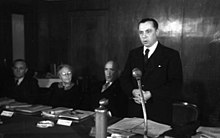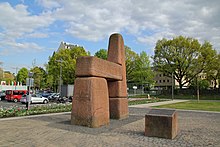Peter Altmeier

Johann Peter Altmeier (born August 12, 1899 in Saarbrücken , † August 28, 1977 in Koblenz ) was a German politician ( center , later CDU ). From 1947 to 1969 he was the second Prime Minister of Rhineland-Palatinate . With a term of office of almost 22 years, he has been the prime minister of a German state for the longest time without interruption .
Life and work

Peter Altmeier was born in Saarbrücken as the son of the association secretary of the same name of the Catholic Workers' Movement and grew up in Koblenz. After attending elementary school, he was drafted into the army , took part in the First World War as a soldier and was finally captured.
After his return from captivity, Altmeier attended business school, completed a commercial training in 1922/23 and then worked as a manager in the private sector. From 1940 to 1946 he was an authorized signatory and managing director of a Rhenish wholesale company.
His estate is in the Koblenz State Main Archive .
Political party
During the time of the Weimar Republic , Altmeier joined the Windthorstbund and became a member of the Center Party . After the Second World War he was one of the founders of the CDU . From 1946 to 1966 he was regional chairman of the Christian Democrats in Rhineland-Palatinate . His successor was Helmut Kohl , who replaced him as Prime Minister in 1969.
MP
Altmeier was a city councilor in Koblenz from 1927 to 1933. After the liberation of the city by the Allies in 1945, he became a member of the local citizens' council. In 1946/47 he was a member of the Advisory State Assembly of Rhineland-Palatinate and was then elected to the Rhineland-Palatinate Landtag . Here he was in 1947 chairman of the CDU parliamentary group and chairman of the nutrition and supply committee. In 1971 he left the state parliament.
Public offices
Altmeier was appointed regional president of Montabaur by the French occupation authorities in February 1946 . After the first state election, he was elected Prime Minister of Rhineland-Palatinate on July 9, 1947 as the successor to Wilhelm Boden . He initially ruled with an all-party cabinet made up of CDU, SPD , LDP and KPD , formed a grand coalition in December 1949 and, after the state elections in 1951, took over the leadership of a Christian-liberal coalition . Although the CDU had achieved an absolute majority in the state parliament elections in 1955 and 1959, he retained the government alliance with the FDP. A CDU / FDP coalition was also formed in 1963 and 1967.
In personal union with the Prime Minister's office, Altmeier headed the Ministry of Economics and Transport from April 9, 1948 to May 18, 1967, and the Ministry of the Interior from October 20, 1949 to June 12, 1951 . In 1954/55 and 1965/66 he served as President of the Federal Council . On May 18, 1969, at the request of the party, he resigned as Prime Minister in favor of Helmut Kohl . As early as 1966, when Helmut Kohl was elected regional chairman of the CDU Rhineland-Palatinate, the party congress had decided that Kohl should "in due course" also become Altmeier's successor in the office of Prime Minister.
During Altmeier's tenure, the state government moved from Koblenz to Mainz in May 1950 , in April 1963 the Second German Television (ZDF) started operations in Mainz and in May 1964 the Moselle shipping route was opened. In 1956, Altmeier was accused of taking advantage of the fact that he was able to purchase the Koblenz official villa, in which he had previously rented as head of government, at an extremely low estimated sales value. In the course of an administrative reform in October 1968, the former five administrative districts were reduced to the districts of Koblenz , Rheinhessen-Pfalz and Trier . Furthermore, Altmeier made a contribution to the creation of "national awareness" in the newly formed federal state .
Honors

Altmeier was awarded the Grand Cross of the Federal Republic of Germany in 1953 . He received honorary citizenship of the city of Koblenz in 1959 . In 1965, the Faculty of Medicine awarded him the University of Mainz , the honorary doctorate . He was later made an honorary senator of the University of Administrative Sciences in Speyer. On January 19, 1976 he was awarded the Saarland Order of Merit. The Peter Altmeier memorial, inaugurated in 1981 on the right bank of the Moselle in Koblenz not far from the Deutsches Eck , commemorates him ; the bank of the Moselle also bears his name. In addition, the Moselle bridge in the wine village of Bruttig-Fankel has been named after it since its inauguration in 1974. Altmeier's grave is located in the main cemetery in Koblenz .
See also
Cabinet Altmeier I - Cabinet Altmeier II - Cabinet Altmeier III - Cabinet Altmeier IV - Cabinet Altmeier V - Cabinet Altmeier VI
literature
- Peter Brommer : Rhineland-Palatinate. Peter Altmeier , in: Walter Mühlhausen, Cornelia Regin (Hrsg.): Trustee of the German people. The Prime Ministers of the western occupation zones after the first free state elections. Political portraits , in: Kasseler Forschungen zur Zeitgeschichte , Vol. 9, Verlag Kasseler Forschungen zur Zeitgeschichte, Melsungen 1991, pp. 273–293, ISBN 3-925523-06-5 .
- Richard Ley: The government formations in Rhineland-Palatinate in 1947 also from the perspective of constitutional law , in: Yearbook for West German State History 41 (2015), pp. 699–742.
- Karl M. Graß : Introduction , in: Peter Altmeier, Reden, 1946–1951. Selected and ed. by Karl Martin Grass and Franz-Josef Heyen , ( Publications of the Parliament's Commission for the History of the State of Rhineland-Palatinate , Vol. 2) Boppard am Rhein 1979, pp. XV – XXII, ISBN 3-7646-1745-4 .
- Franz-Josef Heyen : Peter Altmeier (1899–1977), Prime Minister of Rhineland-Palatinate , in: Franz-Josef Heyen (Hrsg.): Rhineland-Palatinate comes into being. Contributions to the beginnings of Rhineland-Palatinate in Koblenz 1945–1951. A publication on the occasion of the Rhineland-Palatinate Day ( Publications of the Commission of the State Parliament for the History of the State of Rhineland-Palatinate , Vol. 5), Boldt, Boppard am Rhein 1984, pp. 199–208, ISBN 3-7646-1848- 5 .
Web links
- Literature by and about Peter Altmeier in the catalog of the German National Library
- Works by and about Peter Altmeier in the German Digital Library
- August 12, 1899. Peter Altmeier was born in Saarbrücken. in: State Main Archive Koblenz
- August 16, 1959. Peter Altmeier, honorary citizen of the city of Koblenz. in: State Main Archive Koblenz
- The Rhineland-Palatinate state governments ( Memento from May 11, 2009 in the Internet Archive )
- Video files ( Memento from May 16, 2008 in the Internet Archive ), etc. a .: Altmeier resigns
- Estate in the state main archive Koblenz (LHA Ko Best. 700,169)
- Abendschau - Prime Minister Peter Altmeier becomes an honorary citizen of Mainz (TV report from October 9, 1965) via the ARD media library .
Individual evidence
- ^ Peter Altmeier, History of the CDU, Konrad Adenauer Foundation . In: Konrad Adenauer Foundation . ( kas.de [accessed November 15, 2017]).
- ↑ See Richard Ley: The formations of government in Rhineland-Palatinate in 1947 also from the perspective of constitutional law, pp. 709-739.
- ^ Herbert Schneider : Prime Minister. Profile of a political office in German federalism . Leske and Budrich, Opladen 2001, ISBN 3-8100-3030-9 , p. 60.
- ↑ Loose blouses. In: Der Spiegel, 37/1968
- ↑ Jens Ivo Engels: Just bought everything? Corruption in the Federal Republic since 1949 . wbg Theiss, 2019, p. 52 .
- ^ Announcement of awards of the Saarland Order of Merit . In: Head of the State Chancellery (Ed.): Official Gazette of the Saarland . No. 4 . Saarbrücker Zeitung Verlag und Druckerei GmbH, Saarbrücken January 28, 1976, p. 67 ( uni-saarland.de [PDF; accessed on May 25, 2017]).
| personal data | |
|---|---|
| SURNAME | Altmeier, Peter |
| BRIEF DESCRIPTION | German politician (Center, CDU), Member of the State Parliament, Prime Minister of Rhineland-Palatinate |
| DATE OF BIRTH | August 12, 1899 |
| PLACE OF BIRTH | Saarbrücken |
| DATE OF DEATH | August 28, 1977 |
| Place of death | Koblenz |

